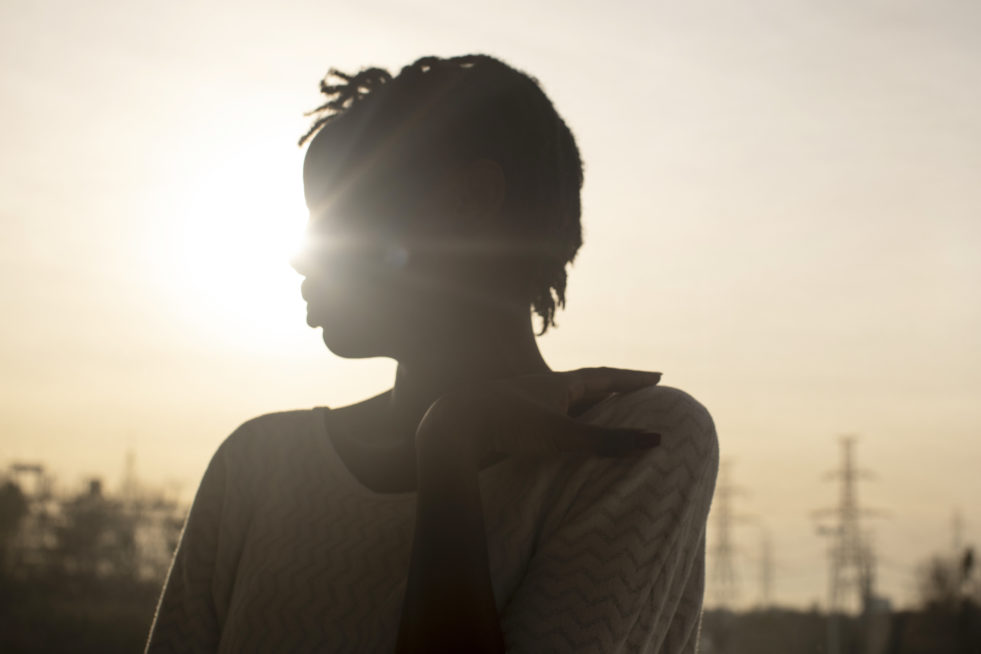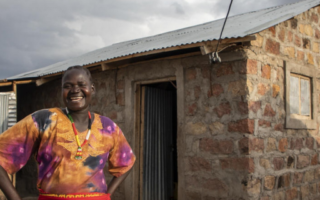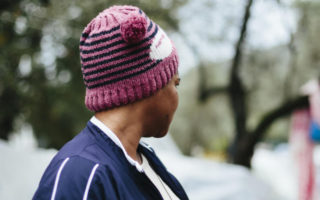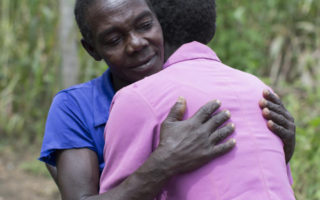
Janet*, a refugee from Uganda, is photographed at the Willowdale Welcome Centre, in Toronto, Ont. The 80,000-square-foot, two-storey shelter is designed for single adult refugees and can accommodate 120 female and 80 male residents. © Chris Young
In the midst of a city-wide housing crisis, a local shelter gives newcomers the tools to find a stable beginning.
By Lidia Abraha
When Janet* landed in Toronto’s Pearson International Airport from Uganda, she was immediately taken to the Willowdale Welcome Centre—the first city-run homeless shelter for refugees.
“I slept through the weekend. First time I slept, and I wasn’t worried about who was coming after me,” said Janet, who escaped her abusive ex-husband in Uganda.
The marriage was forced by her father, who was a highly respected elder in their tribe. Although their union wasn’t recognized in the courts, she was considered his property and received no protection from the years of violence and abuse from her husband.
“Even when I reported, nothing happened, because they would always (say), ‘He’s your husband. He’s allowed to do what he wants.’”
It wasn’t until she was kicked out and left on the streets with her young son that she was able to escape. With the help of a friend, she evaded her husband and went into hiding. While on the run, she received many threats and changed phone numbers and addresses – even having to take her son out of school.
“I was in fear of death, and persecution. It was at the point I actually almost died,” said Janet.
“At that point, I realized I had to leave the situation I was in because it wasn’t good for me, and if I stayed I was going to end up six feet under the ground.”
Sexual and Gender-Based Violence (SGBV) refers to any act that is perpetrated against a person’s will and is based on gender norms and unequal power relationships. It encompasses threats of violence and coercion. SGBV can be physical, emotional, psychological or sexual in nature, and can take the form of a denial of resources or access to services. It inflicts harm on women, girls, men and boys, causing forced displacement in all parts of the world.
UNHCR is mandated to provide protection for victims of SGBV. More than 21,000 victims of SGBV have received help from UNHCR operations in 2019.
In her journey to Canada, Janet had to leave her son and new common-law partner behind. Even though she’s still in touch with them, it’s very hard to feel safe while her family is under constant threat.
After spending thousands of dollars, Janet was able to get a visa and leave Uganda. With nowhere to go, she was immediately brought to the Willowdale Welcome Centre upon arriving in Toronto.
“They can help you get on your feet,” said Janet. “It’s like a stepping stone… while you’re trying to figure things out, they’re there to help you get there.”
Janet has started taking classes on gender, sexuality and women’s studies through Ontario Works, a government program that provides financial and employment assistance to those in need. She dreams to one day become a social worker, and to be able to help other women and girls in vulnerable situations.
“I want to fight for women everywhere,” Janet said, “Being in Uganda… you can’t do that because women cannot be as vocal as men can be.”
The centre provides legal and educational resources for all residents. This includes access to legal aid assistance and workshops that help refugees apply for housing.
“This building has been a response to the need that refugees have, and the idea that if you have a building, a place and an agency that specializes in services for individuals, you’re going to get a one plus one equals three kind of thing,” said Patricia Mueller, CEO of Homes First.
In Toronto where vacancy rates are less than one per cent, and rent continues to skyrocket, thousands are struggling to keep a roof over their heads–especially refugees. The average lease for a one-bedroom apartment had risen to $2,056 at the end of the third quarter in 2019, as found in a report by Urbanation. According to statistics cited in a recent report from the Globe and Mail, a refugee couple with two young children would barely be able to afford a two-bedroom apartment, even with help from Ontario Works and the child tax benefit.
The opening of the Willowdale Welcome Centre came at a crucial time for refugees in need of shelter. Many residents have found community and built lasting relationships there. Recently, a group of seven residents banded together to rent a five-bedroom house. They also had two residents who were from a small village in Nigeria, but met for the first time at the centre, and ended up finding an apartment together.
Patricia said this was an unexpected benefit to the shelter, and that they’ve seen many residents find housing within a few months. Since opening in mid-November 2019, Homes First has found housing for 96 residents as of January 2020.
The Willowdale Welcome Centre is nested in an old hydro building north of Toronto. While the developers have plans to demolish the building and turn it into a condo, they had no problem lending the space to the City of Toronto in the meantime.
“We’re focused on the redevelopment, not the interim use. So, if the interim use is something good, that gives back, and helps us out a little bit, it’s fine,” said Hessam Ghadaki, who is among the four families who founded Times Group Corporation, after fleeing war-torn Iran and immigrating to Canada.
“The refugee centre gives them some safety as they embark on their journey,” he said. “So we’re very happy to help at the beginning of that journey, but at the same time, we can see that there’s so much more that we can do, and that everyone can do, to make that transition from refugee to a safe, happy, healthy Canadian citizen.”
The lease for the shelter was originally supposed to end in April 2020. However, that agreement has been extended — though Homes First doesn’t know for how long. Once the lease expires, they plan to work closely with the City of Toronto to either continue operating or transferring residents to other appropriate programs.
For residents like Alice, who came to Canada with almost nothing in her pockets, she’s looking forward to new job opportunities, and a fresh start on life without her family name holding her back.
Coming from a small village in Uganda, Alice’s father had four wives and her mother was the only one from a different tribe. Once her father died, there was some dispute about who would receive the inheritance. She was under constant threat of violence from people in her village and did everything she could to find safety elsewhere.
“I am here mainly because of discrimination. It was something that I endured for a really long time, I wanted to be somewhere where I could actually be myself, and start fresh with no biases,” said Alice.
The centre was able to provide her with legal assistance to help her find work. They also provided her with winter essentials, since she arrived in the middle of winter with only a blanket and a few sweaters.
“I don’t even know how I would survive. I think if there were no places like this, it would be so hard for most of us. Even if you come with money, money runs out. You need a place you can actually go, and know that I can actually start from there,” said Alice.
*Names have been changed to protect the identities of interview subjects.





